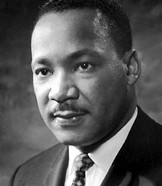
It has been a while since my last blog. One reason is that this is generally the season of holidays, family get togethers, and travelling. The second is reason is that I have wanted to add something to the conversations happening in the United States about the tensions between Black Americans and the police, the Confederate flag, and the state of uneasiness between blacks and whites. However, like the good academic I am, I did not want to say something until I thought I had a sound basis for doing so. Here are my thoughts.
My biggest reflection on the current situation is that Jesus, Martin Luther King, and Ghandi were more impressive, right, and amazing as leaders than we give them credit for. The concept of practicing non-violence and to love — not hate — your enemies is so easy to say, but so difficult to practice.
Two things sadden me the most about the current conversations over “black lives matter.”
The first is the obvious: that in 2015 we even have to have a discussion about how killing unarmed black Americans is wrong.
The second has to do with the language we are using to have the discussions.
When someone uses hateful language to denounce detest a hateful act, they are not living within the spirit of what Jesus, King, and Ghandi would have taught. Instead, they are compounding the reasons for the tensions in the first place.
The most positive occurrence in the aftermath of the killings in South Carolina is the taking down of the Confederate flag. I think this was accomplished because the families of the victims of this horrific event asked for calm, preached love and not hate, and went back to church to pray. They advocated for peace, and not looting and rioting. Their composure allowed the media, lawmakers, and others to focus on the core issue; that the Confederate flag is sometimes used as a symbol of hate and this benefits no one.
As I watched events play out, I thought we need to find a way to use language to express our sadness and frustrations in ways that will be heard, not reacted to.
So how do black Americans form language around our sadness and frustrations? And, equally important, how do white Americans, the media, and politicians learn to hear what black Americans have to say?
In Canada, we have been trying to heal from an extremely sad period in the nation; a period when Aboriginal children were forced to leave their family and to attend Residential Schools. While I am not an expert in the origins of the policy and the impact this directive had on Aboriginal lives, I am impressed by the careful and deliberate process constructed to help get past this sad period.
Canada created a Truth and Reconciliation Commission. In short, the commission was created to listen. And while it listened, it cringed as many people told about the horrors they experience while living in these Residential Schools, and how this horror impacts their lives today. (If you are interested in learning more, follow this link to the report at http://www.trc.ca/websites/trcinstitution/index.php?p=580.)
I think it is time for the United States to create a Truth and Reconciliation Commission, and to create smaller Truth and Reconciliation Commissions across the nation so we all have a chance to talk – and to listen.
In fact, I’m experimenting with this it in my own circle. I have a really good white friend who has a son that is about three years older than my sons. The sad events in the United States have created an opportunity for us to talk about the differences between how my sons perceive and are perceived in the world, and how his son sees and is seen in the world. At times this conversation is tense, at times it is sad, but mostly it is honest. For our conversations to work, we truly have to listen to each other and not talk past each other.
So my advice, and the advice that I tell my sons as they contemplate going to university in the United States versus going to university in Canada, is to listen. Is there injustice in the world? Yes. What can my sons do about it? They can understand what Martin Luther King meant when he said, “Darkness cannot drive out darkness; only light can do that. Hate cannot drive out hate; only love can do that.”
I leave you with one last suggestion. Dan Ariely gave a great TedTalk called “Our Moral Buggy Code.” He makes a great point that is germaine to this blog. He says that it is hard to listen to someone as long as you think you are right. For listening to occur, we first have to realize that maybe we (the person trying to listen) isn’t right, or doesn’t have all of the answers.” Please consider this as you practice listening – for a better future for all of us.
You can watch Dan Ariely’s Ted Talk here. http://www.ted.com/talks/dan_ariely_on_our_buggy_moral_code?language=en



